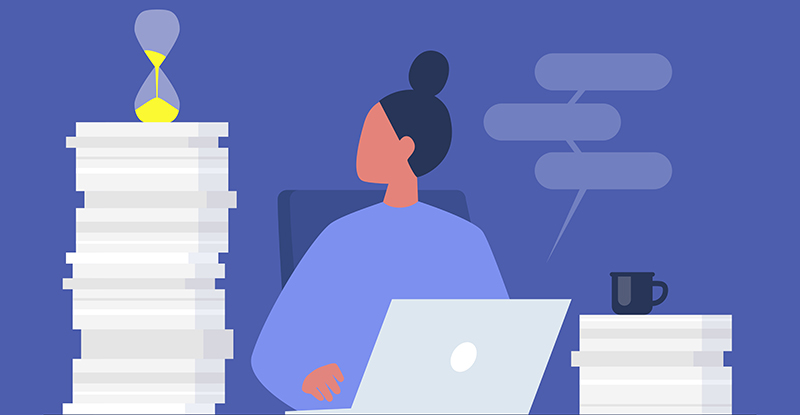
Listen to our podcast episode with this article's author Glen Sollors, where he discusses the signs of burnout and ways to start addressing it. Part of our Coffee Chats with CPABC podcast series.
Access mental health resources through Telus Health
All members, candidates, and students, along with their immediate family members, have access to confidential help through the Telus Health (formerly LifeWorks) Member Assistance Program. You can access the program by phone, web, or mobile app:
- Toll-free: 1-844-880-9142
- Web: login.lifeworks.com
- App: Download the free LifeWorks app on Android or iOS from Google Play or the App Store (username: bccpa; password: Lifeworks)
Our minds and bodies are designed to survive. Second by second, day after day, these two systems devote an immense amount of energy and resources to helping us assess, respond to, and cope with threats and stressors. Our stress response systems are optimized through our five senses, which constantly monitor what is happening around us to determine whether we are at risk.
These days on top of common daily stressors such as minor interpersonal conflict and email overload, and more extreme occasional stressors such as illness, we are also being impacted by the lingering and constant threat of COVID-19. It is no wonder then, that stress levels have increased. The pandemic has caused countless unknowns and this uncertainty and lack of control naturally elevate stress levels.
Combined with the challenges of the pandemic, many of us also face the challenges of a full workload mixed with competing demands. The stress this can create not only affects us, it may also impact others through our reactions, body language, and behaviours – for example, it might take the form of working long hours, limited availability, and lack of focus. Unchecked, in a workplace context, may lead to an individual and team feeling overwhelmed, deflated, and low on morale – we can’t seem to get ahead.
Unfortunately, in many organizations, this is the new normal due to financial pressures, downsizing, and the need to ‘do more with less.’ The demands may not go away, but how we deal with the associated stress can improve.
Being more mindful is a critical component of reducing stress and feeling more balanced when in a state of overload. Mindfulness at its root is focusing on one thing at a time. Even though you may feel this is impossible to do, if you don’t make the conscious effort to take steps to reduce your stress, things are likely to compound and get worse.
Mindfulness gurus like Eckhart Tolle, Jon Kabat Zinn, and Thich Nhat Hahn are capitalizing on stress by motivating people to stop, breathe, meditate, and be present. This is easier to achieve than you think. Being mindful is not ‘the pursuit of enlightenment’, but rather – in a work context –is the pursuit of being in control of your work versus work controlling you, and impacting you and your team in negative ways.
In their book, Mindfulness: Finding Peace in a Frantic World, authors Mark Williams and Danny Penman provide great insights into the mind and how, if we can better control it, we can better manage stress. The stress management strategies below are adapted in part by their recommendations.
- Move your body: We are the most sedentary population in history. Lack of movement not only decays our body, but it also decays our mind. Many of us go home and would rather watch other people in action while seated comfortably on our couch.
Exercise not only reduces the build-up of toxins in our body due to stress, but it also helps us to breathe and get oxygen flowing to our entire system. All parts need to function well, and exercise is a great way to keep our body and mind in tune.
- Stop catastrophizing: Our mind likes to predict the future and solve problems. For many, it creates worst-case scenarios coupled with excessive analysis. This is also known as ‘monkey mind’. Regardless of the stress contributor, stop fighting the stress.
We need to accept our situation, say “I am feeling stressed!”, breathe, and stop analyzing. Our mind and body will begin to relax and lighten up on pumping our veins with bad stuff.
- Focus on breath: Close your eyes, put your hand on your abdomen, breathe in deeply and imagine your body filling up with air. Now breathe out slowly through your mouth and repeat ten times. Congratulations – you’ve just accomplished some mindful breathing!
This gives your heart a breather and even two minutes of mindful breathing will give you a momentary sense of calm and peace. Studies have shown that doing this regularly makes a lasting difference in how we process stress.
-
Meditate: Levitating off a mat in cross-legged position while donning your Lululemon gear and chanting a mantra is not necessary. Instead, try turning off the TV 60 minutes before bed to calm your mind.
This also gives you time to sit and mediate, which can be as simple as sitting in a quiet space with your eyes closed while striving to feel your body sensations (don’t worry about trying to stop those pesky thoughts). This activity can not only lead to a more restful sleep, but it may also help you fall asleep quicker.
-
Be your friend: Too often our inner critic takes over and focuses on the negative aspects of our work life versus what we should be grateful for. Take the time to be compassionate and kind to yourself despite the stress – what are you doing well? Congratulate yourself for doing your best and acknowledge the care, commitment, and other positive behaviours that you’ve demonstrated throughout the day.We matter and quite often, we overlook ourselves!
Taking care of you is a critical pre-requisite to continuing to do a great job, as well as not becoming a victim to the serious damages ongoing stress can cause.
Author
Glen Sollors is a partner at the business consulting firm Kwela Leadership and Talent Management and a presenter with CPABC’s Professional Development Program. Glen has over 20 years’ experience in driving results by working with leaders in developing strategic business opportunities, managing associated change, and enabling team success through role modeling, training, self-awareness, coaching, and problem solving.



